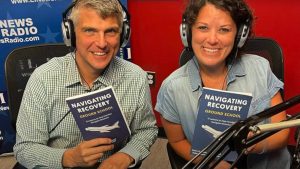
On the journey to getting to sober, identifying triggers that might stand in the way of recovery is necessary. It’s not uncommon for people who struggle with addictions to relapse at least once during recovery due to these triggers. Some even fall off the wagon several times before committing to sobriety. In fact, despite undergoing numerous FDA-approved treatments for nicotine, alcohol, and opioid addiction, more than two-thirds of individuals will still relapse after rehabilitation.
Understanding what your triggers are and having a plan to address them are the first steps toward prevention. Here are five triggers you should consider and consult your therapist or counselor about:
Stress
Stress is the main cause of relapse among patients. Many people who struggle with addiction rely on their weakness. They turn to their substance of choice as a maladaptive way of coping with it. In fact, research indicates that the desire for drugs, alcohol, or addictive activities increases during stressful situations. This goes higher if the substance or activity was the person’s primary coping mechanism.
One way to prepare for this trigger is to evaluate the stress you’re experiencing. Although you can’t eliminate everything and everyone from your life, you can avoid situations that make you anxious. For instance, are you in a toxic relationship or dealing with a difficult financial situation?
Making The Needful Changes
By making changes in your lifestyle and reevaluating your relationships and priorities, you can make a change. It can reduce the number of stressful situations in your life. This will in turn, reduce the likelihood of a relapse. It will help to list all the people, places, and things that negatively impact you. Now you can pinpoint what needs to be addressed.
It’s also important to learn positive ways to successfully manage the stress. You might be able to reduce or manage your stress by:
- Practicing mindfulness and engaging in relaxation training.
- Managing your time more effectively to avoid operating in panic mode.
- Increasing healthy behaviors by incorporating moderate exercise and healthy eating.
Reducing the likelihood of a relapse does not involve finding healthier coping mechanisms alone. It goes further into being able to recognize when you are in a stressful situation. This will help you to take action immediately and de-escalate it. A therapist or counselor can teach you ways to improve your mind-body connection. This is a great skill that will help you create healthier habits, and better manage your stress levels.
People or Places
The people with which you participated in addictive behavior are potential triggers for a relapse, regardless of whether they are still drinking, smoking, or using drugs. Similarly, certain places that remind you of your addiction can be triggering for you. Even your family members could be a trigger, especially if they make you feel more child-like and vulnerable.
When you’re reminded of your addiction, it’s important to have effective of addressing your feelings. For instance, if you’re an alcoholic and a group of old drinking buddies ask you to go out, or you see people from work going to happy hour, it might help to have a rehearsed response for the invitation.
It also may help to have a healthy activity that you can do instead, like going for a run, seeing a movie, having dinner with a sponsor, or reading a good book.
If you don’t prepare for these situations ahead of time, you become susceptible to relapsing. Try brainstorming ideas or work with your counselor/therapist to create a plan.
Negative or Challenging Emotions
People who struggle with addiction need instant help. They need effective ways of tolerating, managing, and understanding the negative emotions they encounter throughout the day. Alcohol, drugs, or addictive behaviors once served as temporary refuge from those feelings. But they can no longer be relied upon anymore. It is important to learn how to get comfortable with discomfort. Realize that everyone experiences negative or challenging emotions. The key is how you deal with them.
Try to see it as an opportunity for growth and understanding. Learning how to face your emotions without escaping into addictive behavior is an invaluable skill. One that allows you to better understand yourself. During recovery, finding healthy ways to release your negative energy and boost your mood is imperative. Journaling, meditating, praying, or practicing any other mindfulness exercise can also be very beneficial. If these don’t appeal to you, an addictions specialist or another mental health professional can help. Through their aid, you will develop additional coping strategies better suited to your needs.
Seeing or Sensing the Object of Your Addiction
Anything that reminds you of your addiction can trigger a relapse during recovery. A whiff of cigarette smoke or seeing people sip cocktails in a bar is a trigger. Even a restaurant ambience can have a deep impact in the early stages of quitting. Wanting to fall back into your addiction is normal. After all, it’s a familiar place for you. But, recovery is not just about “quitting” and “abstaining.” It’s about building a new life in which it’s easier, and more desirable, not to use.
You may feel as if you miss your old life when you see these reminders. However, this same thing you miss, only brought pain and hardship into your life. Think about the negative consequences that you experienced during your addiction. Remember the good people you hurt and the relationships you lost. Did that really make you happy? Probably not.
Instead, focus on the new life you are building. Embrace the idea that you’re creating a healthier version of yourself through the changes you’re implementing. Having a behavioral substitute, can be helpful. Like going to a yoga class or taking a long bath, when you’re feeling triggered. Even reciting positive mantras or doing relaxation exercises may help you resist these urges as well.
Times of Celebration
Triggers are not always negative; celebratory situations, such as birthdays and holidays, can be triggering as well. You may feel happy, in control, and confident. You think you can handle one drink, one smoke, or one mild flirtation with the attractive stranger. But can you really keep it under control?
People who struggle with addiction frequently lose their capacity to know when to stop. That one drink or smoke could turn into a binge. Treating yourself to one, unnecessary new pair of shoes could lead to a full-on shopping spree. Having the support of a friend can be beneficial in situations where you are at risk of relapse.
Find someone you trust and respect. Assign this person to firmly, dissuade you from succumbing to your addiction in social situations. You might be surprised how quickly your resolve and good intentions disappear once the party has started.
Finally
With your counselor or therapist, put together a plan. This plan will guide you on how to handle the temptations that accompany social events like parties, weddings, and holidays. If you go into the situation unprepared, you may go against your better judgement and end up relapsing.
About Adam Banks
Adam Banks is a certified interventionist and the owner of Adam Banks Recovery. After receiving an MBA from the University of Chicago, Adam built a company that was later acquired by United Health Care. His discipline and attention to detail comes from his former career as an airline pilot, holding an ATP, the FAA’s highest license.
Today, Adam is dedicated to helping others achieve long-term sobriety. His work has guided executives, pilots, and physicians on paths to recovery. Adam brings families together through a loving and inclusive approach.
Adam has authored four books on addiction. His recent work, Navigating Recovery Ground School: 12 Lessons to Help Families Navigate Recovery, educates families on the entire intervention process. He also offers a free video course for families considering an intervention for a loved one.
Adam is available for alcohol and drug intervention services in New York, Long Island, the Hamptons as well as nationally and internationally.




